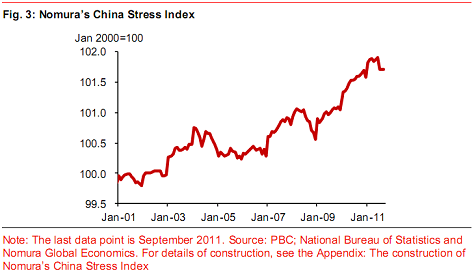Nomura has recently introduced a new indicator which they will be updating on a quarterly basis. It covers macro risks to the Chinese economy. They call it the China Stress Index. Recent readings show increasing strains in the Chinese economy largely due to pressures from their housing market (via Nomura):
“The CSI indicates that risks in China‟s macro economy have been on a broad uptrend, and more noticeably since the global financial crisis. In Q2 2011, the CSI rose to its highest level since it was first compiled, but in Q3 it eased slightly, mainly because of a decline in the flow of new shadow banking funding (Figure 3). One limitation of the CSI is that it does not give a probability of a hard economic landing. To do so would require a reference variable measuring past episodes of hard economic landings in China, the obvious one being real GDP. Yet in the past 20 years China’s GDP growth has not fallen below 5% and before then the causes of hard landings in GDP were influenced heavily by social and political unrest.”
“A closer look at the components reveals that rapid increases in residential housing starts relative to sales, residential property prices, gross capital formation, property loans and domestic credit have been the main recent drivers. We are under no illusions that the CSI has its limitations and needs to be treated with caution. The results of the CSI, which we will update on a quarterly basis, should always be open to interpretation, and used as a tool among many others for analysis of China macro risks.”
Source: Nomura
Mr. Roche is the Founder and Chief Investment Officer of Discipline Funds.Discipline Funds is a low fee financial advisory firm with a focus on helping people be more disciplined with their finances.
He is also the author of Pragmatic Capitalism: What Every Investor Needs to Understand About Money and Finance, Understanding the Modern Monetary System and Understanding Modern Portfolio Construction.


Comments are closed.